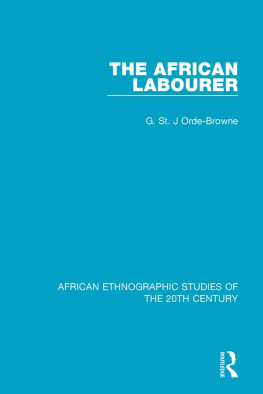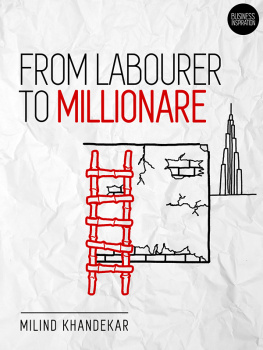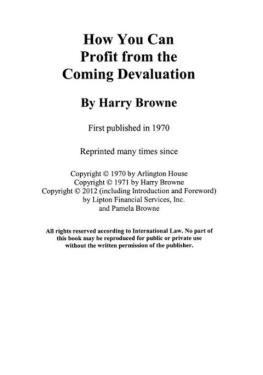AFRICAN ETHNOGRAPHIC STUDIES
OF THE 20TH CENTURY
Volume 52
THE AFRICAN LABOURER
THE AFRICAN LABOURER
G. ST. J ORDE-BROWNE
First published in 1933 by Oxford University Press for the International African Institute.
This edition first published in 2018
by Routledge
2 Park Square, Milton Park, Abingdon, Oxon OX14 4RN
and by Routledge
711 Third Avenue, New York, NY 10017
Routledge is an imprint of the Taylor & Francis Group, an informa business
1933 International African Institute
All rights reserved. No part of this book may be reprinted or reproduced or utilised in any form or by any electronic, mechanical, or other means, now known or hereafter invented, including photocopying and recording, or in any information storage or retrieval system, without permission in writing from the publishers.
Trademark notice: Product or corporate names may be trademarks or registered trademarks, and are used only for identification and explanation without intent to infringe.
British Library Cataloguing in Publication Data
A catalogue record for this book is available from the British Library
ISBN: 9780815387138 (Set)
ISBN: 9780429488139 (Set) (ebk)
ISBN: 9781138597273 (Volume 52) (hbk)
ISBN: 9780429486999 (Volume 52) (ebk)
Publishers Note
The publisher has gone to great lengths to ensure the quality of this reprint but points out that some imperfections in the original copies may be apparent.
Disclaimer
The publisher has made every effort to trace copyright holders and would welcome correspondence from those they have been unable to trace.
Due to modern production methods, it has not been possible to reproduce the fold-out maps within the book. Please visit www.routledge.com to view them.
THE AFRICAN
LABOURER
B Y M AJOR
G. S T . J. ORDE BROWNE
O.B.E. (Mil.)
Published for the
INTERNATIONAL INSTITUTE OF
AFRICAN LANGUAGES & CULTURES
by OXFORD UNIVERSITY PRESS
LONDON : HUMPHREY MILFORD
1933
CONTENTS
OXFORD UNIVERSITY PRESS
AMEN HOUSE, E.C. 4
LONDON EDINBURGH GLASGOW
LEIPZIG NEW YORK TORONTO
MELBOURNE CAPETOWN BOMBAY
CALCUTTA MADRAS SHANGHAI
HUMPHREY MILFORD
PUBLISHER TO THE
UNIVERSITY
PRINTED IN GREAT BRITAIN
I F the treatment of the workers by the privileged classes may be taken as a true criterion of the ethical standard attained by a community, the treatment of African labour affords examples reaching from the era of slaverywhen the labourer himself was a saleable commodityto the spectacle of a standing International Committee of Experts engaged in drafting Conventions to govern the treatment of wage-labour by European employers.
It is with problems of this kindof housing, diet, wages, the mutual obligations of employer and employed, the duration of contracts, the method of recruiting, habituation, and repatriation, and the precautions needed to avoid the disintegration of native social lifethat Major Orde Browne, at the invitation of the International African Institute, deals in the present book.
He is no mere theorist, for as Head of the Labour Department of Tanganyika he has had ample opportunity of putting to a practical test the precepts he advocates. Moreover, by study of the legislation and the practice of the different Governments in Africa, he is able to indicate to what extent they have found it practicable to adopt these principles.
The days of harsh treatment and cruel punishment belong, we may hope, to decades now past. But kind treatment and adequate food are no more than an owner bestows on his domestic animals, or a slave-owner on his household slaves. Something more is required, and the problem of to-day is to ensure that service with Europeans shall not result in the premature disintegration of native society. For the illiterate worker who has lost faith in the approval or the anger of the spirits of his forebears, who has renounced his tribal loyalties and his claim to a share in the family or clan land and the ready help of his fellows in time of need, has now no motive for self-control and becomes a danger to the State.
Should the labourer from a distance bring his wife and family to save him from the temptations and immorality of the labour camp, or will he by so doing sever the strongest of the ties which bind him to his village home? Should the labour-camp with its haphazard congeries of men from different tribes be transformed into an homogeneous model settlement, preserving its accustomed ritual observances, or is such permanent association with an alien race compatible with an evolution which must be gradual if it is to be real and permanent? Can the employers needs be met, while the labourer learns better methods of life and of agriculture, if the contract does not exceed six months, with compulsory repatriation; or will the journeyings to and fro and the break in continuity of work prove too great an obstacle?
Major Orde Brownes analysis will help the reader to form his own conclusions on these and many other similar problems, the right solution of which will have a profound effect on the future of those Colonies in which large numbers of Africans are employed by Europeans.
LUGARD.
ABINGER
20 February 1933.
T HE great and growing importance of all problems connected with labour, which has been such a prominent feature in the history of almost every country since the World War, has been as conspicuous in Africa as in any other continent; there, the renewal of the activities suspended during hostilities speedily produced a demand for manual workers that entailed a widespread shortage, and it became increasingly obvious that development must to a large extent be controlled in accordance with the labour available for the various forms of enterprise. Closer attention was thus paid to all aspects of the problem, and innovations of all kinds were introduced to improve the available supplies of labour both in quantity and in quality. Furthermore, in sympathy with the ideals which had found expression in the formation of the League of Nations and the establishment of the Mandate system, there was a strong philanthropic movement towards amelioration of the circumstances of employment. These influences, acting independently but concurrently, produced a rapid advance in knowledge of the difficulties and complications to be faced, and labour administration in all parts of the continent made considerable progress.
The subject, however, has hitherto lacked treatment on a broad basis, and research work has too often tended to be parochial in scope and myopic in outlook. Most valuable information has been accumulated, and data of the highest importance collected, but in almost every case these refer to the special requirements of one particular country, either from the industrial or from the sociological point of view; the comparative study of the whole problem in its present form in various parts of Africa, with the developments to be expected, and the interrelations resulting, has passed generally overlooked.
The upheavals and readjustments consequent upon the Great War are far from finished, and Africa has been as profoundly affected as the rest of the world; instead of regular and progressive development of untapped resources, existing enterprises have been rudely shaken by the factors which have threatened the whole fabric of the capitalist system. The needs of the world, however, remain as great as ever, and the economic exploitation of humanitys untouched assets must progress whatever the system of control. Temporary restriction and stagnation will render the return to activity an increased strain on the social fabric, and there would appear to be a genuine danger that industrial progress may outstrip administrative measures, with possibly disastrous consequences. There is thus a real need for some comprehensive study of the African labour situation on the widest possible basis.












